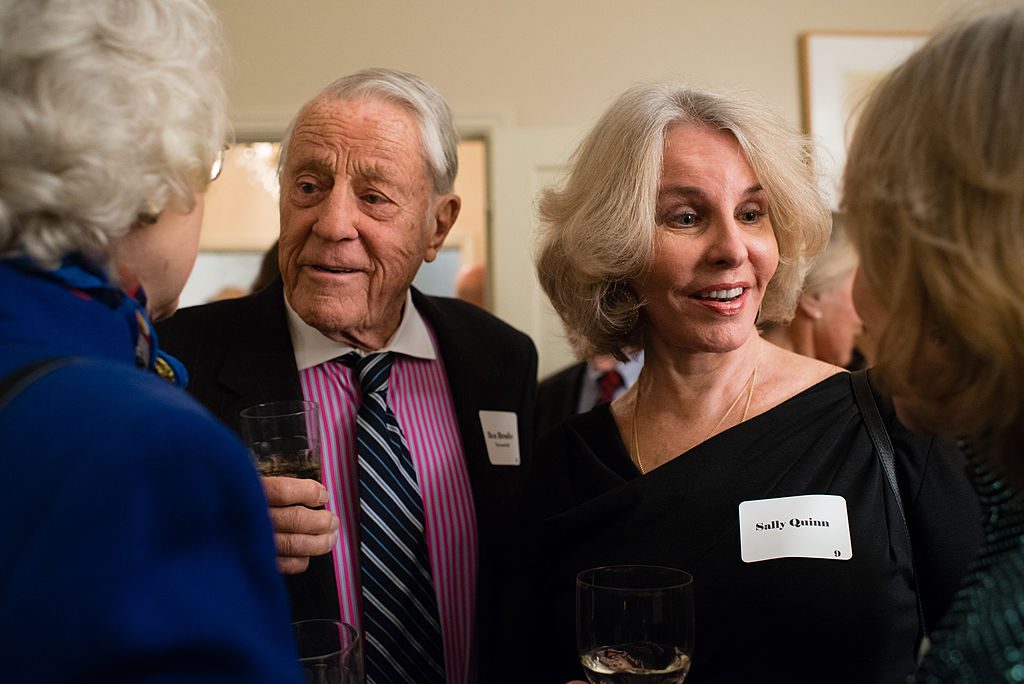Sally Quinn and the Death of the Washington Establishment

Sally Quinn is not someone likely to garner sympathy at a populist magazine. A former style reporter at the Washington Post and wife of legendary Post editor Ben Bradlee, Quinn for decades presided over Washington’s elite social life. To be invited to her house on N Street in Georgetown was to make it into the city’s most exclusive inner sanctum, the territory of senators, ambassadors, evening news anchors.
Quinn is the establishment of the establishment, which is to say every smarmy upstart writer in this town has mocked her at some point, present company included. And reading her latest essay at the Post, it’s hard not to do it again (“A little lightbulb went off in my head one day when I was reading an article about my late husband, Ben Bradlee, and me…”). Yet the piece is also something else: a perceptive commentary on how Washington has changed. Quinn’s gentry used to wield real power, all those martinis and black ties, back when people knew what the Alfalfa Club was and a Georgetown cocktail party was more than just a pejorative.
Now:
In the beginning of March 2020, our world shut down. Within days people were holed up in their houses or apartments. Nobody went anywhere, and if they did, they were masked and furtive. Now, 14 months later, even as the city begins to reopen, I am convinced that the social lives of Washington players will never go back to what they were before the double blow of Trump and covid. And despite — or perhaps because of — my decades immersed in the social life of this city, I won’t be unhappy to see it radically transformed.
The center of the old social scene was always the president, and its decline began not under Trump but Obama, who could be coldly reclusive. And this transformation hasn’t just affected the upper echelons. Lowlife Washington, with which I’m far more familiar, has followed a similar track. Most of my favorite downtown dives were massacred in the COVID recession. Happy hours have been nonexistent for a year. People have moved away, into the burbs and beyond. The three-martini lunch, once a D.C. institution, has been dead for decades. The Post recently surveyed that damage in a postmortem for a bar called Post Pub that used to be near its headquarters:
Back in the era of hard-drinking lunches, bartenders at the Post Pub used to stir up three-gallon batches of gin and vodka martinis and a two-gallon batch of Manhattans to prepare for the daily crush. And that was just for Mondays.
“I don’t know if we’d go through all of it in one day. It might go into Tuesday,” says owner Bob Beaulieu. “We were selling two or three hundred martinis a day.” …
The change in American drinking culture hurt the Post Pub’s bottom line, Beaulieu says. He went from serving hundreds of martinis a day in the 1970s to about a dozen a day when the 1990s rolled around.
What happened? Washingtonians got healthier and more idealistic, as the Post notes, and then we started staring at our smartphones and binge-watching Netflix at home on our Apple TVs. Power, both high and low, has thus become less about sociality and more about D.C.’s new currencies: big money and media visibility. Both have served to make us more ascetic. Once Senator Everett Dirksen hung a clock in his office on which every number was a five and legislative roadblocks were washed away with aged whiskey. Now congressmen spend their evenings begging for money from donors one minute and dashing for the cable news cameras to denounce the elites the next.
Not that we should romanticize Quinn’s Washington. The old set could be petty, snobbish, exclusive, catty, and aristocratic. Yet I wonder whether we’re really so much better off now. Has there been some recent smashing policy success I’m not aware of? Is it really more productive to war with the other side on our smartphones rather than sitting down at white-clothed tables with them? We don’t yet know how much COVID, with its concomitant work-from-home revolution, will permanently change Washington. But my guess is, to quote Michel Houellebecq on the world more generally, that the city “will be the same, just a bit worse.”
Quinn is more optimistic. She thinks the Biden administration will help further necessary change:
These days there is a sense of revulsion at the grift, indecency and cruelty that has emanated from Washington. More important, too many people have suffered and died. There is also a growing gap between the haves and the have-nots, and an increased awareness of racial injustice. So many groups in town now have their own hierarchies; in fact, what used to be called the A-list by some is not even in another person’s alphabet. For one thing, the old A-list was almost completely White, which makes no sense with the new diverse power structure in the Biden administration. Anything that smacks of elitism and privilege will not have much appeal. Those who really might be considered elite would recoil at the word, the notion. It is, well, elitist.
But they are elites, no matter how many “Black Lives Matter” bumper stickers they slap onto their Chevy Volts. In which case, maybe the question to be asked about the hip, new, egalitarian, Twitter-addled A-list is this: which is worse, elites who behave like elites or elites who pretend they aren’t elites?